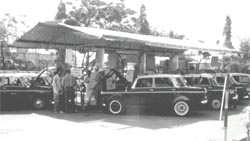The CNG route
 the Delhi cng drama is about to be re-enacted in Mumbai. But there is a difference. Like the Supreme Court in Delhi, the Mumbai high court has taken the initiative to clean up the air of India's commercial capital. However, the Mumbai government is proactive towards moving to cng , unlike the Delhi government, which is trying its best to undermine the apex court's initiative. Augmentation of the cng fleet, financial incentives for phasing in cng taxis and phasing out older vehicles seems to be the mantra for justice B P Singh of the Mumbai high court, which has held a series of hearings since April 30, 2001.
the Delhi cng drama is about to be re-enacted in Mumbai. But there is a difference. Like the Supreme Court in Delhi, the Mumbai high court has taken the initiative to clean up the air of India's commercial capital. However, the Mumbai government is proactive towards moving to cng , unlike the Delhi government, which is trying its best to undermine the apex court's initiative. Augmentation of the cng fleet, financial incentives for phasing in cng taxis and phasing out older vehicles seems to be the mantra for justice B P Singh of the Mumbai high court, which has held a series of hearings since April 30, 2001.
"We have argued for bringing in cng as soon as possible. While following Delhi's bid to ban old commercial vehicles, the V M Lal committee, set up by the court, has gone one step ahead: it has recommended the phasing out of older private vehicles as well,' says Shiraz Rustomjee, of Bombay Environmental Action Group ( beag ), a non-governmental organisation. The organisation is fighting the case on behalf of the Smoke Affected Residents Forum ( sarf ), which had initially filed a public interest litigation. The court is expected to pass a series of directions in the second week of May, 2001. These directions will be based on the recommendations of the Lal committee and an affidavit filed by Pramod Krishnarao Sagdeo, deputy secretary, government of Maharashtra. Though the government affidavit asked for extensions for meeting the deadlines, it seems to have accepted in principle that the cng route will be beneficial as far as improving the air quality is concerned. "The government and the civil society are working together to achieve this goal,' says Sandip Rane of sarf.
"The court has not heard this case for some time now and most of the deadlines have been missed. Therefore, it is heartening that the government has taken the initiative to come up with its own set of deadlines. We only hope that they meet them,' says Zinnia Khajotia, member of the Lal committee.
Proactive on CNG In its May 2000 order, the court directed the government to convert diesel taxis to either petrol or cng . At that time, more than half the fleet of the 55,000 taxis in Mumbai were running on diesel. But within less than a year, the situation has changed. By April 18, 2001, more than 21,000 taxis were running on cng . The government, on its part, has been proactive in promoting cng . For example in March, reports of two cng cylinders bursting in Mumbai sent the city into a tizzy. Though it was later found that one was a illegally fitted domestic liquefied petroleum gas ( lpg ) cylinder and the other was a spurious cng cylinder, the officials did not issue statements against cng
Related Content
- Order of the National Green Tribunal regarding construction of a sewer line along a 600-metre stretch of the Yelahanka Puttenahalli Lake Bird Conservation Reserve, Bengaluru, Karnataka, 02/05/2025
- Order of the National Green Tribunal regarding rising pollution in the Vishaw stream, a tributary of the river Jhelum due to illegal mining, Jammu & Kashmir, 23/04/2025
- Affidavit filed by Chhattisgarh East West Railway Limited regarding construction of the rail link between Gevra Road and Pendra road, Chhattisgarh, 15/04/2025
- Action taken report by MCD regarding a garbage dump near AIIMS, Delhi, 16/01/2025
- Order of the National Green Tribunal regarding solid and liquid waste management in Sikkim, 16/01/2025
- Order of the National Green Tribunal regarding encroachment of a water body Chandan Polchari, village Gopinathpur, district Puri, Odisha, 05/12/2024
